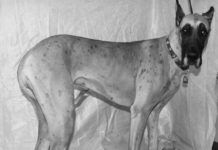Where do the stem cells for clinical research come from?
When stem cells come right from the patient into whom they are later injected, they are called autologous cells. If they come from another dog, they are termed allogeneic cells. With autologous cells, a doctor harvests some tissue from a dog - either a bit of bone marrow or fat tissue - then sends that tissue to a lab, which isolates the stem cells from the tissue and cultures, or grows, them. Then they are injected…
Dog Owner Fear of Surgery
Dog owners are generically worried about anesthesia and surgery, says John Berg, DVM, a veterinary surgeon at Tufts. But they tend to be specifically worried about chest surgery. When you open the chest cavity, the dog cant breathe on his own and has to be on a ventilator, which understandably scares people. Also, chest surgery is usually about the heart or lungs, organs that are important to life on a second-by-second basis. As a…
New Ways to Reduce the Risk for Bloat
It has been standard advice for a number of years that to reduce the risk for bloat, a life-threatening condition in which a dogs stomach literally flips over and knots up blood vessels leading to the spleen and other tissues, owners should not let their pets run around or engage in any other physical activity right after eating. Our mothers never let us swim after we ate, says Tufts veterinary surgeon John Berg, DVM,…
The Progression of Alzheimers – Or Not – in a Dog
Back in October, we introduced Sydney, a 13-year-old golden retriever who, by all accounts, seemed to have the canine version of Alzheimers disease, called canine cognitive dysfunction. Her owner, Karen Feeney of Littleton, Massachusetts, described what is commonly referred to as Sundowners syndrome, a condition seen in both people and dogs experiencing cognitive decline. Its characterized by an anxious burst of energy after dark. The condition kept Sydney agitated, pacing, and startling easily when…
When the Voice Box Becomes Paralyzed, The Dog Struggles to Breathe
It was when Sam-I-Am started coughing continually and breathing heavily, particularly in warm weather, that Lucy Keefe decided to bring the 12-year-old chocolate Lab to see John Berg, DVM, a soft tissue surgeon at Tufts and the editor-in-chief of Your Dog. It turned out Sam had developed a condition called laryngeal paralysis, most commonly seen in older, large-breed dogs such as Labs and golden retrievers. …
Getting At the Root Cause of Laryngeal Paralysis in Dogs
Historically, laryngeal paralysis has been thought of as an idiopathic disease, meaning no cause had ever been identified. It appeared to spring up on its own, with a changed bark noted about half the time and two out of three dogs with the condition experiencing difficulty inhaling, gagging, throat-clearing, coughing, or choking sensations, most often associated with eating and drinking. …
Dear Doctor – Sluggish thyroid, or faulty lab result?
Letter to Tufts Veterinarians - Sluggish thyroid, or faulty lab result?
An End to the Dog’s Itching
Whitney, a beautiful Great Dane, was absolutely fine until she turned about a year and a half. Thats when she started developing bumps on her skin. When the problem worsened, she would get secondary skin infections - sort of lesions on her skin, says Kim McCollough, Whitneys owner. There was some itching and hair loss, Ms. McCollough adds, but she looked worse than she was in terms of discomfort. …
Can Kissing Your Dog Give You Gum Disease?
Newspapers from New York to England to India have now reported that kissing your dog can transmit gum disease. News anchors have broadcasted the same information. And Googling kissing dog gum disease yields no fewer than a dozen pages of site after site warning against sharing a peck with your pet. …










